#and then humans suffer no consequences and take no responsibility???
Explore tagged Tumblr posts
Text
LEVI ACKERMAN: WHY HE IS HUMANITY'S STRONGEST SOLDIER
This post contains:
An in depth analysis on Levi's motivations and what underscores them
His view on his strength
Why Levi is so reserved
Why Levi was obsessed with killing zeke



Levi presents a nuanced exploration of the gap between initial impressions and underlying motivations.
While his initial demeanor appears stoic and potentially aloof, bordering on arrogance, a closer look can reveal a profound sense of responsibility and dedication driving his actions.
Levi's act of comforting a dying comrade while vowing to eradicate the Titan threat signifies a deeply ingrained sense of purpose.

This act transcends mere pragmatism, demonstrating an emotional connection to the fallen and a commitment to the collective cause of the Survey Corps.
His vow is a promise to honor the sacrifices made by countless individuals, carrying their collective resolve forward in the fight for a Titan-free world.
He is burdened by the weight of loss yet driven by an unwavering commitment to the ideals and the fallen comrades of the Survey Corps. He embodies the collective hope of humanity, particularly those who dedicate their lives to the eradication of the Titan threat, ensuring that the sacrifices made will not be in vain.
His physical prowess is a defining aspect of his character and role within the narrative.
His strength serves as a pillar of support for those around him. His ability to consistently survive and excel in battle, as evidenced by his reassurance to the dying comrade, instills a sense of hope and security in his comrades. He becomes a symbol of unwavering resilience amidst the constant threat of annihilation.
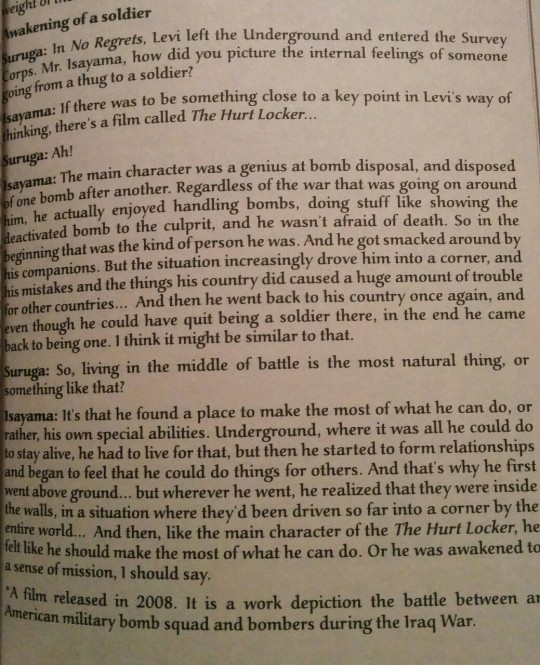
However, Levi's perception of his strength extends beyond its immediate utility. He views it as a burden, a responsibility inextricably linked to his title as "Humanity's Strongest Soldier."
He recognizes that his superior abilities often come at the cost of countless lives lost around him, leaving him as the sole survivor in dire situations. This realization fosters a profound sense of duty within him.
Levi's strength compels him to carry the memory and legacy of the fallen. He acknowledges that his survival necessitates fulfilling their unfulfilled aspirations and carrying forward the collective resolve of the Survey Corps.
This is exemplified in his willingness to take responsibility for Eren, even to the point of eliminating him if necessary, and in Erwin's unwavering trust in Levi to handle crucial tasks, such as subduing Beast Titan.
While Levi's immense strength grants him immense power, it is not a source of pride or personal gain.
As Kenny said, Levi is a slave to being a "hero".
He feels an immense responsibility to utilize his power for the greater good, becoming a protector and champion for humanity in their desperate struggle against the Titan threat. This unwavering commitment manifests in various ways, from advocating for the desperate measures of feeding civilians to his relentless dedication in the fight against Titans.
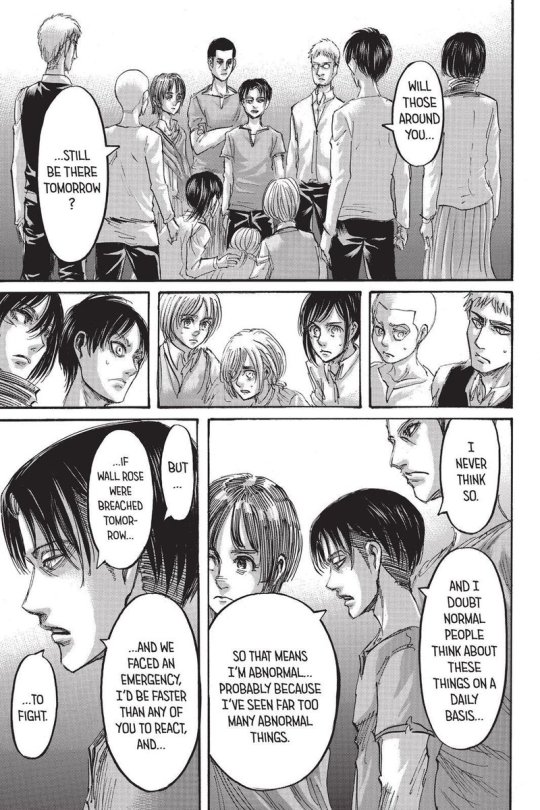
Levi's reserved demeanor is a consequence of a life marked by constant anticipation of tragedy and the loss of countless comrades.
His atypical upbringing, from the harsh realities of the underground to the brutal world of the Survey Corps, has instilled a deep-seated expectation of further losses.
This environment makes emotional expression difficult, leading him to adopt a detached exterior as a coping mechanism.
However, Levi's emotional self-preservation doesn't diminish the profound care he harbors for human life. He fights relentlessly for the sake of strangers, suffers immense anguish with each squad he loses, and his empathy for suffering stems from his own deprived childhood, where basic necessities like sunlight and food were scarce.
Throughout the manga, Levi endures a relentless cycle of loss, constantly grappling with the responsibility of being the "last man standing."
He carries the weight of their sacrifices, driven by the unwavering determination to fulfill their shared dream and ensure their deaths were not in vain. This ever-growing burden continues to shape his reserved nature and fuels his unwavering dedication to the fight for humanity's survival.
Levi's unwavering dedication extends beyond his own burdens. He readily takes on the emotional weight of others, particularly evident in his interaction with Erwin.
When Erwin confesses his guilt and internal turmoil regarding the lives sacrificed in the charge, Levi deliberately chooses to shoulder that burden himself.
This act transcends mere support; it is a conscious decision to relieve Erwin of the immense pressure associated with the lives lost.
Levi explicitly states, "I am making the choice," signifying his deliberate assumption of the responsibility.
This choice carries immense consequences. Levi takes on the horror of the charge and the weight of all the lives lost – the recruits who perished and ultimately, Erwin himself.
This decision contributes significantly to the profound weight that burdens him throughout the manga.
It manifests in his overwhelming sense of failure when he ultimately cannot eliminate Beast Titan, and his heartfelt apology to the charging recruits further underscores the gravity of the responsibility he carries.
As the manga progresses, the weight on Levi's shoulders intensifies. Eren, the boy he once vowed to protect and take responsibility for, ultimately betrays humanity, leaving Levi questioning the "awful joke" of the sacrifices made throughout their journey.
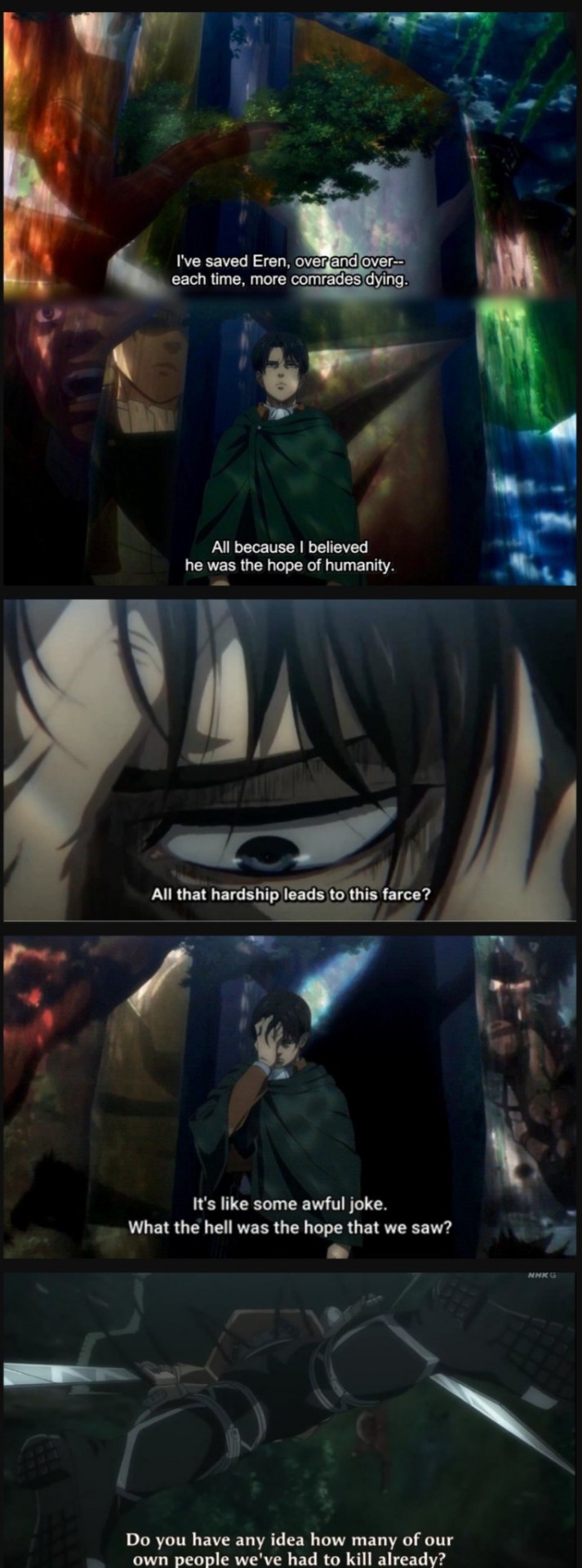
The lives he feels deeply responsible for, even going so far as stating to Zeke that he views them as "killed" by their actions, become a constant source of internal conflict and fuel his unwavering determination to continue the fight for humanity's survival.
As Levi enters the final battle, the physical and emotional toll he bears surpasses anything he has faced before.
He loses the last remaining comrade from his friend group (Hange), faces the seemingly impossible task of fighting his former subordinate, and suffers critical injuries, losing an eye and fingers just days prior.
Despite his weakened state, his sense of responsibility intensifies. He refuses to rest even when Armin urges him to, driven by an internal pressure that compels him to fight.
No external force compels him to engage in this final battle; it is solely driven by his overwhelming sense of responsibility.
His determination to protect his remaining comrades manifests in his actions – offering himself as bait for Mikasa, saving Jean, and enduring further injury while saving Connie.
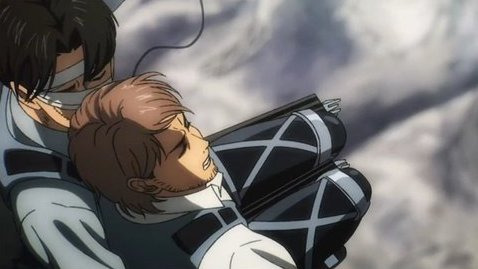
Even while coughing up blood, he maintains a facade of strength, burdened by the weight of being humanity's strongest.
Finally, after temporarily being sidelined due to his injuries sustained while saving Connie, the immense pressure he has been carrying throughout the narrative culminates in a moment of vulnerability.
Levi is forced to confront the "awful joke" of their situation once again. Now physically broken, Levi contemplates his inability to contribute further, succumbing to self recrimination in the face of immense loss, horror, and guilt.
He questions the purpose of their struggle, wondering if it was all in vain.

However, amidst this profound despair, Levi exhibits a remarkable resilience. He reaffirms the idealistic dream that the Survey Corps fought for, recognizing the inherent value of the lives lost and refusing to succumb to regret.
He chooses to look forward, believing in a better future and the potential of the next generation of idealists. Even in the darkest moment, physically unable to walk and coughing up blood, Levi remains the voice of reason, urging Mikasa to pull it together as they are the "only ones left who can kill Eren."
This unwavering commitment to his duty proves the fact that Levi never stopped fighting, even when his own body betrayed him.
Despite being presumed out of the fight, Levi's unwavering spirit compels him to push through his debilitating injuries and excruciating pain.
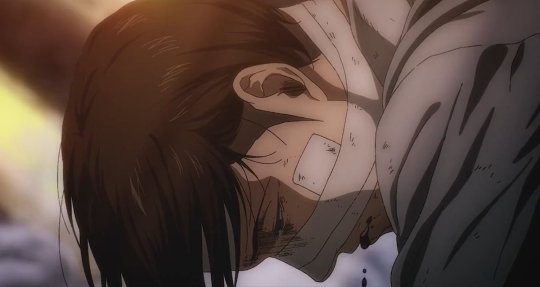
This final act of defiance proves crucial in both halting the Rumbling and saving countless lives, fulfilling the promises he made to his fallen comrades and granting meaning to their ultimate sacrifice.
In the aftermath, a profound shift occurs within Levi. He acknowledges the immense contributions of his comrades, recognizing that their unwavering dedication fueled his own actions.
The immense pressure and the burden of countless lives he carried finally lifts, allowing him to release the pain he had bottled up for so long.
For the first time, after enduring countless tragedies, we witness Levi shed tears, signifying a release of the emotional weight that had burdened him throughout his arduous journey.
Levi's title as "Humanity's Strongest Soldier" extends far beyond his physical prowess.
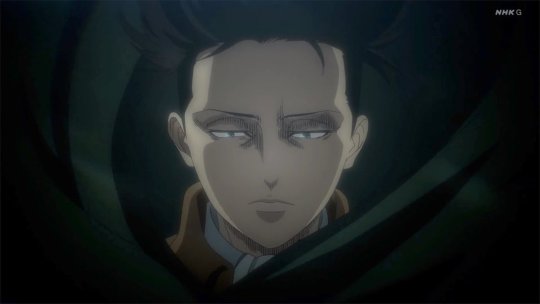
It is his unwavering mental fortitude, forged from constant struggle, that truly defines him. He chooses not to succumb to bitterness or resentment, even after facing a lifetime of hardship and loss. Instead, he exhibits an extraordinary resilience, fueled by an unwavering determination to protect humanity.
Many characters within the narrative succumb to the cycle of violence and hatred. They wield their power to inflict pain and dominate others, fueled by the trauma they have endured. Others, like Ymir, become paralyzed by their past, unable to utilize their abilities to help others. Still others, like Zeke, lose hope in the possibility of a better future.
Levi's journey stands as a powerful counterpoint to these destructive tendencies. He demonstrates that even individuals who have suffered immensely, who have every reason to be disillusioned and apathetic, can choose to believe and fight for the betterment of others. He views his exceptional strength not as a privilege but as a profound responsibility, a tool to be wielded for the benefit of humanity and the preservation of individual lives.
Even as the world around him crumbles, Levi continues to exhibit compassion and a desire to contribute positively. He chooses to break the cycle of hate and despair, actively seeking to put more good into a world that inflicted immense pain upon him. This unwavering commitment to hope and the value of human life stands as a testament to the enduring strength of the human spirit, even in the face of unimaginable adversity.
Other analyses by me:
Levi and Kenny
How Levi utilizes his intellect in fighting and decision making and his leadership in final battle
Levi Ackerman (an overall analysis? One of my first one so it's not that good ig)
The Yeagers and the Ackermans I: Their motivations and dynamic
The Yeagers and the Ackermans II: The Similarities and the Contrasts
#anime#levi ackerman#manga#shingeki no kyojin#attack on titan#animanga#anime and manga#snk levi#levi aot#character analysis#analysis#cielettosa meta#cielettosa
710 notes
·
View notes
Text
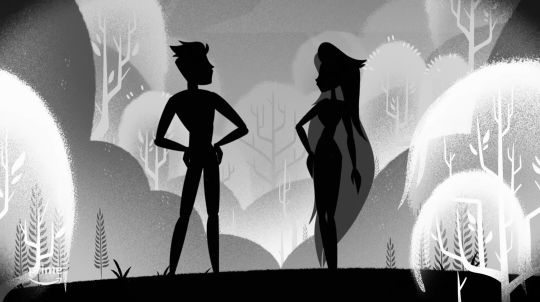
The whole Eden Lucifer-Adam-Lilith-Eve situation is kinda creepy. I see serious groomer undertones in it, given the difference in Lucifer's and humans' life experience (and to extent, maturity) at the moment
Imagine that you are an adult experienced angel who is present during the making of Eden and the birth of first humans. You also apparently want a wife. And to be a part in creation of Eden. What do you do? Find some female angel to marry and live your life with? Find an actually helpful way of working alongside elder angels?
Nope, instead you meddle with the lives of newborn and inexperienced humans in the most destructive way possible.
You could have helped them sort out their disagreements and actually taught them proper ways to behave. But you don't. You groom the naive female human into trusting you and then you encourage her cheating on the male human, causing trauma and insecurities to corrupt his personality in his first few years of living (the most influential in shaping a person's mentality). Thus you become partly responsible for the vengeful monster he will become in the future
More than that, you take away the female human's chance to live safely in paradise or on earth. Because of aiding you in your not-so-well-thought-out-plan (she didnt have any other choice, you and the male human were the only company she had), she is doomed to be allowed to only live in hell the rest of her life. And you knew that no one in heaven was going to give her the benefit of the doubt
As icing on the cake, you don't stop just on grooming and encouraging cheating, you don't leave the male human alone after you've already did him dirty and abandoned him... you come back and corrupt his new wife for some unclear reason (because your "whimsical" ideas of how you'd do a project elder angels know better how to carry out, are never even elaborated upon).
As a result, you doom not only these three babies in adult bodies but also the entire humanity to a terrifying life of fighting sinful outbursts, suffering, surviving, dying and risking ending up in hell where they'll be suffering for an eternity
I'm not sure if writers will ever hold Lucifer accountable for all this in a proper way. Probably not. But thinking about how much he fucked over first three humans makes me wish more depression on him
At this point, Lilith leaving Lucifer is not surprising. Imagine if after maturing and gaining life experience (and already giving birth to Charlie) she realized how her husband was practically using her. That could be why she left after doing her job of raising Charlie until she became an adult that can survive on her own
(I mean, it could be true if hazbin hotel was good at having the characters live through consequences of their actions and not just making Adam a scapegoat who is supposedly like Stella v 2.0 - evil ever since he was born and already inventing patriarchy with his very first breath. Like, all humans are selfish jerks when they are newborn - that's what parenting is for, shaping something more pleasant out of all that selfishness) (notice how the writing only focuses on how Adam was "bad" back in Eden)
(That also gives me a reason to judge angels in general - just a few narrative details really show how little they cared about the first humans' wellbeing and future. It's their fault too that Lilith ended up in hell and had to make some sort of deal to get a chance to visit her home/ Adam became an immature mentally unstable murderer/ and Eve... dunno, we haven't seen her yet)
#hazbin hotel critical#hazbin hotel lucifer#hazbin hotel adam#hazbin hotel lilith#hazbin hotel eve#hazbin hotel
322 notes
·
View notes
Text
I am seeing some garbage takes out there so quick reminder:
Izzy himself doesn't hold a grudge for what happened to his leg because he fuelled the fire that took it.
Izzy knows he suffered the consequences of feeding the darkness and doubt and misery he saw in Ed.
If Stede's leaving led Ed to a cliff, Izzy was the friend who should have helped him and instead he shoved him over the edge and broke him. The man Ed has known longer than anyone in his life, his 'only family', severed the last hope Ed had that he was worth anything without 'Blackbeard'.
Izzy trained a shark to viciously kill... Blackbeard says you taught him everything he knows... tormented him in his weakest moment...This is Blackbeard, Not some namby pamby in a silk gown pining for his boyfriend...and then dangled his legs in the water. Naturally, the shark took his leg.
As Izzy says: 'Served me right, too'.
Which is why people being so furious on his behalf and acting like Ed is an abusive monster is to invalidate Izzy having any agency at all.
Do you also blame Ed for the murder of his father and think he's a bloodthirsty monster?
Or can you recognise that the cycle of abuse and violence corrupted and traumatized him and that his father shares a portion of the blame for his own death?
Perhaps it's more cut and dried in that scenario because people haven't imprinted on Ed's father?
Izzy is not blameless in the loss of his leg and he would be the first to tell you that. He is a complex human who has made mistakes and his whole arc this season was about him reconciling, owning his mistakes and being his true authentic self anyway. And he did it. Fuck yeah.
"BUT ED NEVER APOLOGISED".
Izzy wouldn't have accepted it if he had.
Ed said 'Sorry about your leg', knowing Izzy wouldn't accept a larger apology. His response was to 'fuck off' as it is. Izzy Hands will never accept a full apology or genuine word of kindness and he shut down Ed's attempts because he didn't want or need it.
Izzy's last act on the planet was to let Ed know he's sorry for breaking him. For feeding him to the darkness so he could have 'Blackbeard' to give him his purpose in life when really, Ed had needed a friend. He apologized to remind Ed that he is loveable just as he is. He wants to undo the damage he did.
To love a character is to respect his right to be a fuck-up and own his mistakes. And to let him learn to accept himself despite those mistakes.
This season made me love Izzy. And I am sad he's dead. And I love that he got to redeem himself, find family and a sense of belonging and help Ed heal when he couldn't always help himself to.
You can feel how you want to feel about the ending.
But to sit back and blast creatives for 'Doing it wrong' because you can't process your emotions without projecting it onto others?
Izzy would be disappointed in you, the same way he was disappointed in Stede for picking a fight with Zheng instead of handling his emotions about losing Ed.
"Oh Bonnet, no..."
#izzy hands#ofmd#ofmd spoilers#ofmd s2 spoilers#our flag means death#our flag means death spoilers#ofmd meta
807 notes
·
View notes
Text
Analysis of the new official art of Fyodor for Volume 26

It’s truly magnificent.
I am going to go heavy on the flowers because its meaning is very relevant for the following but don’t worry, there are also many interesting things we’ll analyse. Too many things to say. I am gonna try to stay focused and do something neat. Let’s talk first about the floral background, and the skulls which is honestly the first thing I that intrigued me.
The flowers we can see on the foreground and background are lilies.
• The lilies are a symbol of purity and innocence, representing Fyodor’s ideal vision of a “pure” world free of sinners.
They are additionally associated with the concept of new beginnings and fresh starts, renewal, which could refer to the creation of a new world free of sin. A new start for a pure humanity that Fyodor wishes to establish.
In numerology, lilies are often associated to 7 and 9 :
• The number 7 is linked to spirituality, which aligns with the symbolism of lilies as a representation of purity, enlightenment, and divine connection. And it makes sense with Fyodor’s strong religious beliefs and that he seeks to bring people to a sinless life while fulfilling the will of god.
• The number 9 is associated with completion, humanitarianism, and transformation, which complements the lily’s symbolic role in representing renewal (such as resurrection in Christianity) and which also reminds of the nature of Fyodor’s ability to be brought back to life (like a new man) through the sacrifice of his killer.
Basically �� humanitarianism » is the belief in promoting the welfare of others and taking action to alleviate human suffering. But we’ll look at it on a spiritual view. Basically, in religion, humans suffer in sin : That, therefore, Fyodor is going to take it upon himself to « save » people.
We’ve also, throughout the manga, seen that Fyodor is a « people person » this fact along with this new official art also resonates with a saying of the REAL Fyodor Dostoyevsky : « Every man is not only responsible for everything he does but for everything everyone else does » but anyway I am digressing.
Lilies also signify a higher consciousness, acting as a bridge between the earthly and divine realms. Like Fyodor who acts like the right hand of god by bringing the godly virtue upon humans.
One single thing that is very important that I haven’t said yet, is that the Lily is also associated to death since death itself could be a sociétés to renewal. We could see lilies in churchyards, it is also offered to the family of someone deceased for memorial purposes.
So
HEAR ME OUT : We can also notice ONE SINGLE lily next to Fyodor’s hand on the foreground which could symbolise here Fyodor’s imminent or future death that awaits him OR we can understand that, since said flower is next to his hand, that it’s death and renewal that he’s giving/offering to the world.
• The skulls: These morbid elements ground the viewer in the reality of his actions’ consequences: a massacre and massive destruction to achieve his goal. The combination of lilies and skulls reflects the duality of his intentions, which he perceives as noble but are profoundly destructive.
Conclusion about the association of Lilies and skulls : What we could keep in mind is that the lilies strengthen the idea of purity or “moral justification” that he attributes to himself in his quest, while the skulls remind us of the violence and sacrifices he is willing to make for his ideology.
The Cape and the Fur : Fyodor’s cape is often highlighted when he is represented in key moments of the manga, either by its proportion in the image or often by its movements. Even today, this is the case in this official art.
Fyodor’s black cape is lined with fur, emphasizes his role as an authoritarian and almost divine figure. The fur evokes a high status, a certain royalty, while black often symbolizes mystery (indeed, we know little to noting about Fyodor) or even evil in collective imagery.
Fyodor’s expression and gaze : His calm, almost mocking expression highlights his disdain for his opponents and his sense of superiority. His half-closed eyes add an intriguing aura, as if he is silently judging those who look at him, aligning with his role as an antagonist.
Posture and Aura: His elegance and calmness highlight his role as a methodical and imperturbable antagonist, convinced of the righteousness of his actions. Indeed he has faced numerous people that opposed his ideas throughout his quest. The last one so far was Fukuzawa and at that, Fyodor stays imperturbable, confident in his beliefs.
The Ushanka in His Hands : More than a simple cultural symbol, it could reflect his connection to his roots or the idea of Russia, especially with the fact that he’s bringing it to his chest. Lols it made me think about the fact that he told Atsushi that he was going to go back « home », which, we could guess, would be « somewhere » in Russia as something he couldn’t wait to do. Like at the end of one’s day when you can just go back home after you finished work/ school etc.. this kind of relief and anticipation.
I don’t know if it has its place here but I am just sharing my thought, make of it as you wish.
The general symbolism.
The image seems to reflect the paradox of the character. Fyodor views his plan as a quest for purity and perfection (lilies), yet he sows death (skulls) along the way. The ushanka and other Russian visual elements reinforce his identity and his conviction that he is acting for a higher ideal, even though his approach is cold and ruthless.
Voilà !
Thanks you for sticking around till the end. Do not hesitate to give me your thoughts on it (comments or dms).
It is my first time making an analysis, I was very much excited to make one and today was the day.
.
#bsd anime#bsd fyodor#bungou stray dogs fyodor#bsd art#fyodor x reader#bsd manga#bsd characters#bungou stray dogs#fyodor dostoyevsky bsd
71 notes
·
View notes
Text
The richest 1% of humanity is responsible for more carbon emissions than the poorest 66%, with dire consequences for vulnerable communities and global efforts to tackle the climate emergency, a report says. The most comprehensive study of global climate inequality ever undertaken shows that this elite group, made up of 77 million people including billionaires, millionaires and those paid more than US$140,000 (£112,500) a year, accounted for 16% of all CO2 emissions in 2019 – enough to cause more than a million excess deaths due to heat, according to the report.
[...]
The Oxfam report shows that while the wealthiest 1% tend to live climate-insulated, air-conditioned lives, their emissions – 5.9bn tonnes of CO2 in 2019 – are responsible for immense suffering.
[...]
The report finds that it would take about 1,500 years for someone in the bottom 99% to produce as much carbon as the richest billionaires do in a year.
463 notes
·
View notes
Text
What's wrong with lesson 16 (everything)
A list by yours truly, who is about to collapse if she doesn't vent about it (TW: opinion lmao)
⍣ ೋ The time-travel shit
LITERALLY WHY
It creates so many problems and plot holes that could easily be avoided for no reason.
We leave everyone behind and it's never even addressed?? THEY'RE WAITING FOR US???
Barbatos, supposedly the one that cares about balance and timelines, just goes "well you're stuck here and I literally erased the other MC, good ending :D"
He told her "don't run into anyone" and she decides FIRST THING to head where all the noise is coming from, not trying to hide at all
⍣ ೋ No consequences whatsoever
It's awesome to know no one cared about MC dying
Sure, she's "alive" now, but everyone moved on so quickly??? Even Mammon, who was in the verge of a meltdown.
And it's all because we're Lilith's descendant how convenient
Even Belphie, our murderer who has hated humans for MILLENNIA, had a major switch up at this
Also, the brothers begin to completely disregard MC by treating her like Lilith
Look I understand, it's your dead sister and you miss her, BUT MC IS NOT HER. SHE IS HER OWN GODDAMN PERSON
But the worst part is... MC IS SO DAMN CHILL ABOUT IT
Even if she technically isn't the one who died, you'd expect some kind of uneasiness coming from her, SPECIALLY AROUND BELPHIE
Words can't express how much I hate it
⍣ ೋ Solution
I'm gonna make the devs a favor and fix their game
REVIVAL
MC JUST REVIVES FOR WHATEVER REASON (Lilith's will, the last remnants of her powers, Barbatos' precautions...)
Now you don't have to worry about too many plot holes, focusing on just one timeline
Also this allows her to remember her death, making her trauma more intense and veridical
I know it sounds crazy but if they could pull off lesson 16, they can pull this off
Make the brothers indecisive
They got their little brother back, but at what cost?
Everything is fine now, right? But it's not. MC is not "fine"
Make them conflicted between taking MC's side and comforting her but also welcoming Belphie and make up
MAKE MC UNCOMFORTABLE
I can't stress enough how important this part is
Give her TIME to evolve, develop as a character, and understand her feelings
She wouldn't want to be around Belphie, at all
She might not even wanna be around the others, seeing as they treat her like nothing happened
Make her upset, confused, feel like she doesn't belong, ANYTHING
MAKE HER GO THROUGH THE STAGES OF GRIEF
In fact, if you want to make her relationship with Belphie nourish, you can do that too by not just hey lol I killed you but I'm good now
Make her have nightmares
That's it
Make Belphie notice the dark circles under her eyes and the way she avoids him, then discover she has nightmares
The "now" Belphie could feel guilty
He might try to comfort her, only for her to shy away in response
Seeing as his apologies don't work this early into the trauma, he could enter her dreams and chase those nightmares away, every night, sacrificing his own sleep
THAT is a dynamic I want to see, personally
This could have been done with or without the time-travel, btw
In the time-travel, though, I was also missing some grieving from MC
Remember when I said to make the brothers conflicted? Make MC suffer more too
She wants to go back to her time, her universe, her family. They're waiting for her
But she also doesn't want to leave behind these demons, which have just found peace and happiness after a long time
Here's the catch, No matter what she chooses, she's forced to live her life regretting whatever decision she makes, since she can't make everyone happy and one side must suffer inevitably
An MC going through a heavy trauma and eventually (and slowly) overcoming it would just click with so many players
⍣ ೋ Conclusion
To me, the game didn't fully explore the feelings that going through that experience would bring for everyone, even if the idea itself was interesting. No, more like it didn't WANT to. Making MC go through all that would mean a lot of character development for a big amount of characters and little romance, which is what the game is about.
However, if you can't make that sacrifice, don't settle your game in a world rich in lore. And honestly, with all the explanations and back stories, I don't think obey me! is lacking on that. More so that, even if they were fully capable, they didn't want to go through all the trouble. Remember we're coming from an already fucked up scenario that took a lot of chapters.
Finally, this is just my opinion based on my experience. Of course, you don't have to agree with me in any way.

I have to say, that was relaxing lmaoo
Anyways, since I really like this idea and I've seen several people do it, I'm gonna make my own fanfic exploring how I think lesson 16 would have turned out realistically, hope you stay tuned!
Lethby ༊*·˚
#obey me#om! x reader#om x reader#obey me x reader#obey me mc#obey me x mc#lucifer x mc#mammon x mc#levi x mc#asmo x mc#satan x mc#beel x mc#belphie x mc#lucifer obey me#mammon obey me#obey me leviathan#satan obey me#obey me beelzebub#obey me belphegor#obey me lesson 16#x reader
168 notes
·
View notes
Note
Hmm I wonder if Crowley and the school staff, Riddle, Dence, Ruggie, Azul, Jamil, Epel, Rook, Idia, Malleus, Sliver and Sebek found out that some certain people skipped the school and went to the amusement park? Also how would they react?
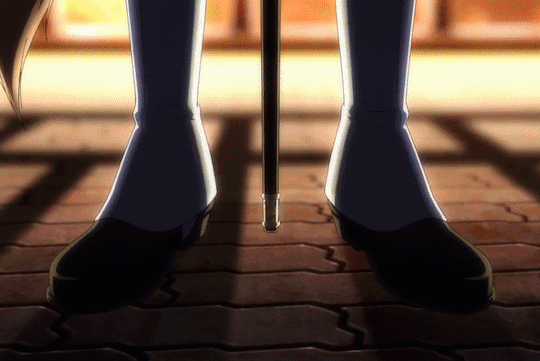
I’d imagine they'd mostly have the pretty normal and expected initial reaction of being shocked that the others snuck out on a school night to a sketchy theme park and managed to come back from a human trafficking operation in one piece. To give a little more detail to each:
Riddle would collar Trey, Cater, and Ace, then lecture them for breaking various school rules, putting themselves in danger, disobeying his command to not sneak out and skip school, etc. He especially lays into the seniors for "not setting a proper example" for the Heartslabyul students.
Deuce awkwardly stands off to the side and watches as they get berated, occasionally nodding and going, "That's right!" in response to their dorm leader. (Ace gets annoyed and tells Deuce off, probably saying something like, "Don't act like YOU weren't interested in going earlier, dummy!")
Ruggie wails about how he would've enjoyed hanging out at a place that offers free everything. He makes jokes to cope with the situation, like poking fun at how the "straight-laced" Jack has a rebellious streak and how Leona's soooo responsible and selfless for chasing after his juniors. Ruggie also jokes about how he's glad his walking wallet "best" employer Leona-san made it back safely... and hey, he wouldn't have happened to have brought back a souvenir for his ever-so loyal hench-hyena, would he?
Azul tries to present as cool and uncaring to the twins; he tells them that if they fucked up and lost their autonomy because of their poor decisions and giving into their curiosity... well, that's their bad and they deserve the consequences of their actions. Jade and Floyd pal around with him, draping themselves over his shoulders and teasing him about how "It's okaaay, just admit that you missed us, admit that you were worried!" Deep down, Azul really was (but he'll never say that out loud and let the twins have an upper hand over him).
Jamil has a fucking heart attack knowing just how close he was to a dead and/or missing Kalim. Not because he cares or anything, but because his own ass would be grass if anything happened to Kalim. Jamil looks him over like five times to make sure not a hair on his head is harmed (all while Kalim is laughing, reassuring Jamil that he's fine, and telling him stories about all the fun times he had at Playful Land). When Kalim starts to suggest inviting Fellow and Gidel to their next banquet, Jamil silences him with a firm, "ABSOLUTELY NOT!!"
Rook waxes poetic about how he's so relieved that their beautiful Vil has returned to them. He'll faithfully fetch Vil whatever he needs to rest and recover from such a heart-pounding adventure!
Epel grumbles about how he wishes he could have gone too ("'N shown those puppets what fer!!"), only to get bonked and told off by his dorm leader. (Ace will tell him stories later, which makes Epel super envious.)
Idia tells Ortho that "touching grass" does them no good, it only brings misery and suffering like what he went through at Playful Land! The worry dies down and is replaced with keen interest the more Ortho tells him about the island's operations. They have a jammer that prevented Ortho's normal functions from working? Idia takes it as a personal challenge--who do they think they are, trying to trump this genius inventor? He'll show them what he's made of by powering up his little brother!
Sebek loudly insists they need to go and dismantle the shadowy organization responsible for attempting something so foolish as to entrap and sell THE Lilia Vanrouge off! Who do they think they are?! Man's absolutely appalled and enraged but also choking back tears at what he perceives is Lilia's nobility, so willing to throw himself into the heat of battle to save others!! Sebek tells Ace he should be "grateful" that Lilia saw it fit to save "such a pathetic lot of humans" from absolute destruction.
Silver frets over his father, but he's ultimately proud of him for acting the role of a reliable senpai and looking out for his underclassmen. (This is the reason he assumes for Lilia going to the shady park.) And, of course, he's glad to have his father back home with him. He insists on looking after him the day of his return, saying that Lilia has gone through a lot lately--and as the triumphant hero, he deserves to relax!
Malleus isn't worried about Lilia (he knows that Lilia can handle himself just fine) so much as he's disappointed that he wasn't invited to go along. He's curious about all that Lilia experienced in Playful Land and listens to his tales with wide eyes. Malleus is not really paying attention to the dangers present (after all, he is confident he could blow it all away if it dares to encroach on his autonomy). Lilia laughs and says they should take a trip to another amusement park sometime.
The staff would be collectively sad that their students would act out like they have. This is especially true of Trein, who is more disappointed than mad. He chastises the boys in a way that makes you feel bad for making like... a grandfather upset. He wonders if he has somehow mentored his students incorrectly or instilled the wrong values in them.
Crewel expresses his disappointment in a different way. He's harsher with his students: "Since you bad boys thought it fit to skip Crewel-sama's lecture, you must have already mastered the materials. Pencils out for a pop quiz!" That's his tough love out on full display, stemming from the desire to ensure that his students can survive on their own out there in the cruel wide world.
Vargas tries to not linger on the negative feelings for too long. He'll encourage the boys to get back on their feet and moving. Movement means more blood circulation, and less of a reminder of the stiff puppets the kids almost turned out to be. Vargas never vocalizes his intentions for fear that him having a negative outlook might influence his students. So instead, he wears a grin and belts out a hearty laugh to keep their spirits high.
Sam will listen to his customers' woes, just as any good shopkeep would! There's a lot of useful information to pick apart from the people who drift in. A strange business like Playful Land? It piques Sam's interest in the mysterious and the unknown--he's delighted with such fantastical tales, and invites his customers to tell more. Sam's always here to lend an ear! And hey, if you get thirsty from all the gabbing, why not buy a drink from the Mystery Shop since you're already there? :)
Crowley wipes his brow and sighs in relief... What could have been a massive PR nightmare was just narrowly avoided!! (He still crows at the students that snuck off though, since he's suuuuuch a caring instructor that deeply cares about their education!!)
#twst#twisted wonderland#Azul Ashengrotto#Malleus Draconia#Riddle Rosehearts#Deuce Spade#Ruggie Bucchi#Jamil Viper#Epel Felmier#Rook Hunt#Idia Shroud#Silver#Sebek Zigvolt#NRC Staff#disney twisted wonderland#disney twst#notes from the writing raven#question#spoilers#twst headcanons#twisted wonderland headcanons#Heartslabyul#Octavinelle#Savanaclaw#Scarabia#Pomefiore#Ignihyde#Diasomnia#Fellow Honest#Gidel
347 notes
·
View notes
Text
Bad Boy
A few meta-type thoughts about Bad Boy, now the dust has started to settle. There could hardly have been more hype in the run up to the release of Shingeki FLY, but Bad Boy certainly delivered. It’s classic Isayama; for such a short chapter it really packs an emotional punch, blending real pathos and tragedy with shockingly graphic violence and body horror. It doesn't really add anything to the over all plot, which is to be expected, but it does provide insight into Levi’s character and answers one question that fans have been speculating about for years.
The story of why Levi holds his tea cup in such a peculiar way isn’t new. Isayama mentioned this in a magazine interview (I think?) way back in 2014
Q: …why he has such way of holding cup? Isayama: About that, I was thinking of drawing this one day. When he was a kid, Levi was living in slums and poverty. He was yearning for a life in clean & neat environment (not rich life). When he finally obtained the tea and tea set those he has been desperately wanted, he was rejoicing that finally he can drink it. But when he started to grip on the handle and lift up the cup, the handle came off and his cup was shattered. He was so traumatised by this experience and that’s why he changed his way of holding cups to not using the handle.
However we now know that the cup belonged to his mother and the extraordinary lengths Levi went to recover it. What is new is that we finally have confirmation of when Levi’s Ackerpowers were awakened. Fans have been arguing about this for years; some thought it was when he killed the man with the knife immediately before Kenny left, others suggested it was when Farlan and Isabel were killed. Now we finally have an answer. It’s not exactly clear how much time has lapsed between Kenny taking Levi in, his powers awakening, and Kenny leaving, however the fact that Kuchel’s tea set hadn’t yet made its way to the surface suggests that not much time had passed at all.
Levi’s description of his powers awakening is fascinating;
“Strangely enough I didn’t doubt what was happening to me at that moment. The pain had vanished, my head was calm, as if it had been immersed in water. Clear instructions on what to do came to my mind. I simply followed them one by one.”
This is the most information we’ve ever had about the famous Ackerpowers and goes some way to explaining Levi and Mikasa’s preternatural calm and focus when they're fighting. They really only succumb to panic and despair when their loved ones are threatened. Think of Mikasa in Shiganshina and at Fort Salta, and Levi when Farlan and Isabel die and when he allows Zeke to escape after Erwin rode out to his death.
The panel illustrating Levi’s powers awakening is also interesting as it looks very like a Titan transformation. This suggests there is more than a grain of truth in what the Yeagers said about Ackermans being a by-product of Titan science, who were able to access the power of the Titans without becoming Titans themselves.
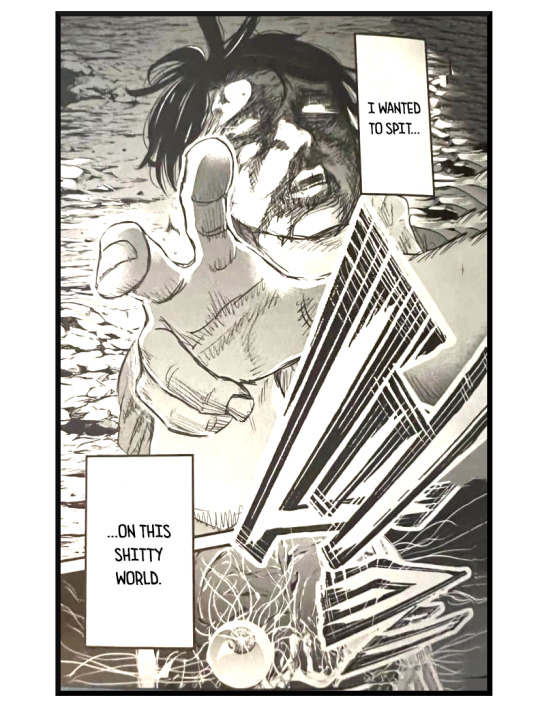
It’s not difficult to draw a direct line between the abuse and persecution Levi suffered as a child, with his determination to use his power to protect those in need. Initially he used his strength to protect the vulnerable people of the Underground, such as Isabel, however once he met Erwin he was able to exert his power to serve an even higher goal - saving humanity. Isayama discussed this in the Answers Guidebook way back in 2006 and I think his comments are worth repeating here.
Isayama With the heroes of American comics, conflicts dealing with the situation “with great power, comes great responsibility” have been depicted. In Levi’s case, if he had no power, he would probably have been an ordinary person with no responsibilities but, as a consequence of having power, that he became a person excessively burdened with responsibility. Kenny talked about “everyone… was a slave to something…”, when he put the question to Levi “what is yours!?”, Levi himself too perceived it. That he himself too was a slave in regard to his own strength. The sense of duty that “I must become a hero”. …the same thing can be said of Mikasa too but…, for the Ackerman family, in the service of their master, there are many people who are able to manifest their power to its maximum.
[Translation by @tsuki-no-ura]
I think it's also very in keeping with Levi's character that he remained devoted to saving humanity after the Rumbling; providing succour to the children in the refugee camp, and working to renew the environment destroyed by Eren's genocide, despite his injuries and regardless of whether he retained his Ackerpowers.
The title of the chapter, Bad Boy, is also interesting. No one actually calls Levi a “bad boy” in the chapter (though he is called worse) which suggests that this is how Levi sees himself. It makes me wonder how much he internalised the thug’s insinuation that his mother would have been disappointed in him, and it also recalls Levi’s speech to Historia and the 104th, where he says he’s fine playing the role of the violent lunatic. Poor baby.
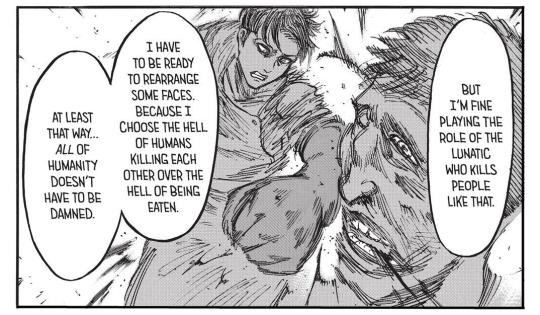
Another point the chapter clarifies is the origin of Levi’s belief that Kenny was his father. To be honest, it’s hardly surprising that Levi assumed this considering Kenny clearly had some kind of relationship with his mother and took him in without question. Still, knowing that the seed of that belief was planted by a thug who was willing to torture and kill a child, or sell him into sexual slavery, really twists the knife.
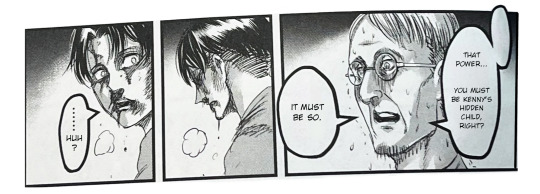
[Translation by krtk.]
I am a little sad that we didn’t see more of Kenny in the chapter, but his presence certainly looms large.
I had expected to see more of Kuchel but at the same time I’m almost glad we didn’t. Her life was brutal beyond measure and we’ve already seen her tragic death. Several fans have suggested that the reason we only see Kuchel in partial profile is because Levi’s memories of her are so hazy, all he really recalls is her grace 😢
It’s remarkable that Kuchel was able to retain such poise and grace despite living in such desperate squalor. @momtaku has made the point that Kuchel appears to have been born into at least modest comfort, judging from Grandpa Ackermans’ home, which would explain where her elegance and also her fancy china came from. It’s heartbreaking that both she and Levi clung on to this small memento of a better life.
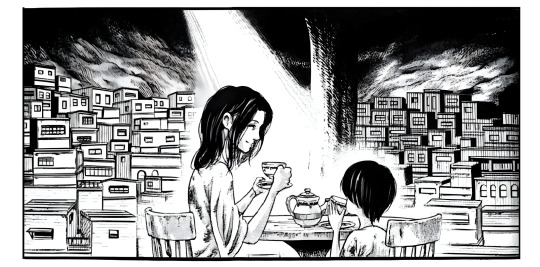
Levi’s devotion to his mother, his desire to emulate her grace and cling on to her belongings is devastating, is very much in keeping with everything we know about his character. Levi has boundless compassion, is deeply loyal, and never forgets those he loves, whether it’s Farlan and Isabel, Erwin, or his squad. He’s also very sentimental; saving his mother’s tea set, and drinking tea evokes a direct connection to Kuchel and the only good thing he remembers from the squalor and cruelty of his childhood. This makes Erwin’s willingness to indulge his sentimentality and bend the rules to procure a steady supply of high quality tea for Levi all the more poignant.
There's been some debate about Gabi's reaction to Levi's story in the final panel...
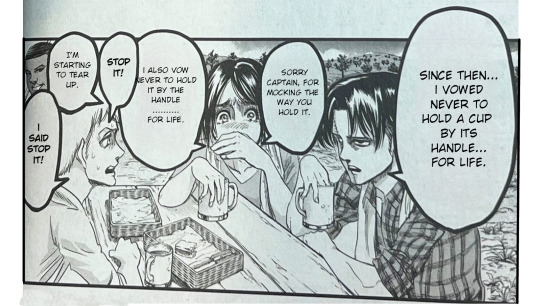
Some people have interpreted her expression as holding back tears, while others have suggested she's trying not to laugh. I'm definitely in the stifled laughter camp. It just seems so very typical of Gabi and her relationship with Levi...
Gabi: - winds Levi up - Levi: - trauma dumps - Gabi: - stifled laughter / more wind up - Falco: - actually upset - "Would you guys stop??" Onyankopon: - shade -
It's also very typical of Isayama to poke fun at his characters like this, and it stops the story from tipping over into bathos.
There is one burning question that Bad Boy doesn’t answer and it’s this - what tf was kid Levi doing in Mr Smith’s classroom??
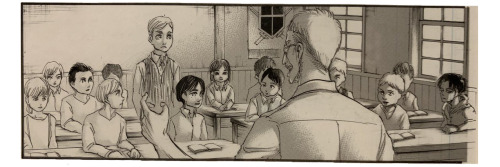
Despite hoping against hope, I never really expected Isayama to answer this, because he does love to troll his readers. Is it too much to hope that sometime down the line he’ll reappear with another chapter called School Boy??
#levi ackerman#kenny ackerman#kuchel ackerman#gabi braun#erwin smith#bad boy#ackermans#ackerpowers#lostcauses meta#snk
168 notes
·
View notes
Text
"After Israel attacked the Tal as-Sultan displacement camp, the Biden administration deliberated, then concluded that Israel’s gradual invasion of Rafah and ongoing bombardment of 'safe zones' – which it had told beleaguered civilians to go to – did not constitute a 'major offensive' that would trigger a response.
Omar Rahman, an Israel-Palestine expert with the Middle East Council on Foreign Affairs, believes the US will never take punitive action against Israel. He said Israel’s Prime Minister Benjamin Netanyahu, who is accused of committing war crimes and crimes against humanity by the chief prosecutor of the International Criminal Court, has successfully 'called Biden’s bluff' throughout the war. 'Netanyahu knew that a red line coming from the US is meaningless because Washington is incapable of holding Israel accountable for its actions,' he told Al Jazeera. Rahman added that every single condemnation coming from Biden has been 'walked back' by his own administration, signaling to Israel that they are not as frustrated as they claim to be. ... Rahman said no talk of 'red lines' will deter Israel from its objective until the country suffers punitive measures for violating international law. He added that Western states are enabling Israel to pursue what he believes is their real goal: the destruction of Rafah, which is the last refuge for civilians across the Gaza Strip. 'Israel went into Rafah despite the warnings and the highly predictable results in terms of human casualties because closing the final lifeline to the civilian population and destroying their last refuge is essential to [Israel’s] goal of liquidating Gaza,' he told Al Jazeera. 'When people like myself use the word ‘genocidal’ to describe Israel’s campaign in Gaza, we are not being hyperbolic.'"
144 notes
·
View notes
Text
I'm over the term "gender equality", and the way in which it is being used and advocated for by the mainstream, status-quo left.
"Men and women are equal" operates under the bias that men are the default standard of equality, which women are then sometimes required or expected to meet. Usually statements like "women are just as strong as men", "women are just as capable as men in sports" act as support.
It intentionally is meant to be cheered on as liberating, but the reality is it's a derivative of "I don't see race I just see people", "no race but the human race", "not disabled just differently-abled", etc. It's a form of sexism that ignores sexism. It's "I am going to ignore biological differences based on sex" when the reality is being of the female sex shapes both my material and lived reality in extremely complex ways and can have dangerous consequences when ignored.
The average woman is not is strong as a man and it often takes a deliberate amount of persistence, training, and/or testosterone injections for us to come close to or meet the male default. "The muscle strength of women indeed, is typically reported in the range of 40 to 75% of that of men". The average man could easily kill and overpower me, and if I were an athlete a man who trained equally to me would defeat me in competition.
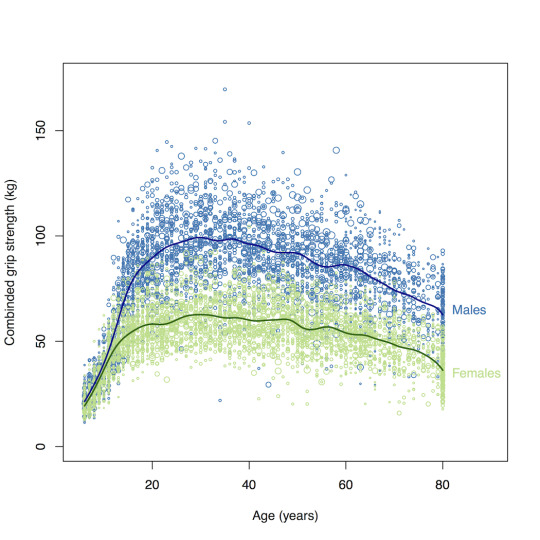
Women are 47% more likely than men to be injured in a car accident. Cars were designed for male drivers. In 2011 was when "female" crash dummies were introduced into measuring car safety in the US, however sometimes organizations in the US and UK just used "scaled down male dummies" to test car safety for women. As this article explains, we are not scaled-down men. We have different muscle mass distribution. We have lower bone density. There are differences in vertebrae spacing. Even our body sway is different. And these differences are all crucial when it comes to injury rates in car crashes. And what about pregnant women?
We have different needs and different experiences than males and the world around is us designed with males in mind - from housing to automobiles, to entire economic systems. 85% of women will eventually be mothers. When women take maternal leave to care for a newborn while the man continues to work (or returns shortly later), he effectively advances his career and over time earns more promotions and pay. His schedule is to focus on his career growth and then come home for a few hours in the evening to play with their child (or play videogames). Mothers pay a significant wage penalty for having children from being months out of the labor market.

This list could really go on.
"Gender equality" is utilized by men to distract women from focusing on only women's rights and needs to men's rights and needs. It's used to shoehorn in arguments of "men too" and sympathizing with men on "men's mental health" (while neglecting the fact that men are overwhelmingly and in shocking numbers responsible for violence done to both sexes - and are additionally unlikely to want to work on themselves mentally).
Reframing and enfolding "violence against women", "women's rights", "male violence", "female liberation", and "women's oppression" into the vague language of "gender equality" is a deliberate act of obfuscating the power dynamics between the sexes - in which men globally exploit and oppress women on the axis of sex.
And as vague language, carves a place for people to have the opportunity to shift the responsibility and blame onto women and girls for the suffering that men wield onto their own sex.
Women and girls do have advantages and strengths over men and boys due to our biological differences - yet this, too, goes ignored under the vague concept of "gender equality" and the cultural belief system it evokes, which treats man as the mold that women should fit.
#gender equality#gender#feminism#radical feminism#gender critical feminism#female liberation#women's rights#women's oppression#misogyny#intersectional feminism
287 notes
·
View notes
Text
I just had. A devastating realization.
In episode 3, when Six says "In our line of work, we need to be careful. People we pull into this life, they can too easily get caught in the crossfire."
And that always stood out to me bc it feels pretty personal, but we don't actually know who he's talking about. Not Holiday - she was in Providence before they met. Not One, he brought Six willingly into the life, and people don't really turn due to exposure with EVOs, so Six wouldn't have "pulled" him into anything. Maybe White getting bleached, but that was more a result of his own actions.
I always kind of thought it was a character we never met, an ambigous "someone" that died in his past, but on a rewatch today, it clicked that while Rex was talking about Circe...Six was talking about Rex.
Six brought Rex to Providence when he could've brought him anywhere else. Providence would've believed the robot destroyed - they did believe the robot was destroyed. Thry definitwly had no reason to link it to this kid. But Six brought this child, this EVO, to a place where he had earlier that day watched them kill another EVOfor research, where they had other human EVOs explicitly caged to deconstruct. He took Rex into the lion's den to show Holiday, and Rex had no idea. Six could've been more careful, and taken Holiday to see Rex instead.
But he was emotional. He was tired from seeing One suffer, tired of killing people and monsters, tired of fighting an endless war. It's very possible that working for Providence is what turned Six from that shitty, cocky guy he was 20 years ago into the tired soldier he was when he met Rex. He saw hope, an opportunity to save people, to save his father and bring hope to the only other person who seemed to care about EVOs beyond killing them.
And for that, Rex suffered. White suffered. Six watched the man he loved be forced into an office and the child and hope he wanted to protect fall under Providence's grasp. He pulled Rex into the life because he wasn't careful, denied him any semblance, any opportunity of a normal life. Six became Rex's protector, but he can't protect Rex from the very thing he pulled him into - the mistake he made because he let hope and desperation drive him.
And...it also makes me wonder. Do you think he feels he doesn't deserve Rex? Do you think his heart drops when Rex jumps headfitst into danger? When he sees the kid hurt on the field, or pushing himself past his limits to save people - do you think Six feels guilty he's in that situation? If he'd been just a little smarter, this child wouldn't be suffering. More people overall would be hurt, sure - but the child he cares about, the child who made him into a better man, would be safe. It's a selfish thought from a man who has only known the selfish life of a mercenary for so long, a man we see selfishly cling to hope with One's suffering.
And part of me wonders if that's part of the reason why he trusts Rex, but he tries to play it by the rules first at the beginning of the show. Thay beyond just protecting Rex, he feels responsible for this current danger Rex is in, and that the best he can do is protect Rex as much as he can, to take the brunt of the consequences of Rex's rebellion and stunts on himself.
#genrex#generator rex#TO BE CLEAR TOO NONE OF THIS IS ME SHITTING ON SIX#These are reasonable reactions and emotions for a guy in his situation with his past to have#Calling him selfish is mostly a commentary on how the Numbers all seemed p selfish and how he was in the last#And to contrast that with how he is now. How he risks his life not for an asset and a doctor. But a son and a partner.#It's about character development and the emotions Six rarely expresses#And he was also maybe afraid of Rex having to live with the guilt of the same mistake#Idk. I'm also just thinking about Six now.#They did not fucking have to go that hard with all these characters (not you Bobo) and yet they did
205 notes
·
View notes
Text
I feel TOH fails a lot with the treatment that Belos and his lore receive towards the end. I think his arc will feel so much more complete if the show was allowed to show us that he suffered in the past and wasn't like "nah he is just pure evil and he has always been like that". I don't like how the show wants you to believe that Caleb did nothing wrong or reprehensible when there's obvious implications that he abandoned Philip to go with Evelyn, it will be so much more interesting that the show recognized that Caleb was naive and selfish in abandoning his brother (who only have him as family and support figure) to his own in the puritan era, and how that action of Caleb deeply damaged Philip emotionally and mentally (kinda like Luz abandoning Camila to live her fantasy in the Boiling Isles without thinking in the consequences (I'm still pissed that she didn't apologize to her mom for running away at the end) but we are not talking about that right now, I love Luz btw don't get mad at me). And Philip, who probably entered the Isles with the sole intention to "save" his brother who at his eyes was bewitched and seduced by an evil witch to go with her, when he finally found his brother after many years and found out that Caleb actually loved Evelyn and DECIDED to leave him behind he totally lost his mind.
A confrontation escene between Philip and Caleb (it could be a flashback or something showed in Hollow Mind even) will be so interesting to watch, something like in the third season of Infinity Train when Simon confronts The Cat for abandoning him as a child, Caleb will try to justify himself at first saying that he is sorry, that he thought Philip was going to be okay on his own, that he didn't thought that he was going to miss him or something, making Philip more angry, sad and confused.
The situation will scale to the point that Philip, (who's original goal was to kill Evelyn to bring back Caleb in the Human Realm) now that he is angry, sad and out of his senses he tries to attack Caleb with the dagger he had in his hand which triggers the knife fight in which Caleb dies.
Philip, after realizing that he killed the only person he had in the world, he tries to justify himself in an internal monologue like: "oh well, I murdered you, but in doing so I freed your soul from the union with that sinful witch. That's what the witch hunting taught me, right? That's what YOU taught me, RIGHT?". Trying to shift the blame for what just happened onto Caleb but also letting us know and acknowledging that it was Caleb who introduced and instructed Philip in the witch hunt and did nothing to reverse it.
Coming to the end, when the fight ends and Belos and Luz are face to face, the scene would play out more or less as we see it in canon but at the moment in which the first drop of boiling rain falls on his hand and begins to see his body dissolve, he enters a mental breakdown in which he realizes that he wasted his entire life on a goal that made no sense, the witches weren't evil or a threat and he knew it, but he clung to his goal because he did not want to face the reality, he did not want to accept that he had killed his brother in vain nor did he want to accept that he had decided to abandon him, and he did not want to die knowing that he wasted 400 years suffering for something that was not worth it. At the end of his collapse he would crawl a little and see Hunter in the distance (because yes, Hunter should have been present in the end even a little), he would try to extend his hand in his direction but Hunter, noticing this, would close his eyes, look away and take a step back behind Eda and Raine. Philip experienced his brother's abandonment again but with the difference that this time it is merely his fault, because even if Caleb damaged Philip deeply with his abandonment, he is not responsable of the path Philip choosed to take.
Seeing and realizing all of this Belos would stop crawling and give up, lying on the ground, breathing hard as the boiling rain finally dissolves him and dies.
Or at least that is how I liked it to happen, let me know what you think.
#toh critical#toh criticism#belos toh#luz toh#philip wittebane#toh salt#toh#the owl house#hunter toh#hunter noceda#emperor belos#hunter wittebane#luz noceda#hot takes
205 notes
·
View notes
Text
Also preserved in our archive
By John Flint
A landmark study has found the virus that causes COVID-19 accumulates and persists in the body - especially the brain - for years after infection.
The international team of scientists believe what they have discovered can help explain long COVID.
The research builds on other studies showing the invasiveness of the SARS-CoV-2 virus and the long-term implications.
“Using optical clearing and imaging, we observed the accumulation of SARS-CoV-2 spike protein in the skull-meninges-brain axis of human COVID-19 patients, persisting long after viral clearance,” the study authors reported in leading biomedical journal Cell Host and Microbe last week.
Meninges are three layers of membranes that cover and protect the brain and spinal cord.
Infectious disease experts in Australia have acclaimed the peer-reviewed study.
Professor Brendan Crabb, Director and CEO of the Burnet Institute for Medical Research and Public Health in Melbourne said the study underlined the need to treat COVID more seriously.
“This work uses cutting edge imaging technology to see things (molecules and cellular structures) to a resolution not achieved before in and around the brains of people infected with SARS-Cov-2 and mice infected with a version of SARS-Cov-2 modified to (infect) mice.
“The virus moves around the body, elegantly confirming what we already know.
“This paper shows that the virus, and especially shed spike protein, can persist around the brain for a long period of time, driving a pathological inflammatory response. This is proposed as a likely cause of the neurological symptoms people with acute and long forms of COVID experience.
“Although not without limitations, this works adds substantially to a large body of work that says COVID enters via the respiratory tract but goes into your bloodstream and so quickly moves around the body accessing many tissues, including the outer regions of the brain.
“Virus in this brain region likely persists and seemingly sheds spike protein which can be further neuro-invasive and persist even longer, (for) years even. This spike persistence is pathological, driving inflammatory responses that have likely consequences for proper brain functioning, such as memory, cognition and neurodegenerative diseases.”
“Next time you think of dismissing COVID as just another annoying common cold it may pay to visualise what you see so starkly in this paper, the virus moving freely around your body and finding a long-term home in all sorts of places where it can really cause trouble, including the brain and the heart,” Prof Crabb, who’s on the board of the WA-based Kids Research Institute Australia, added.
“This work further emphasises the need for individuals, and societies as a whole to take this infection more seriously and try and reduce the amount of transmission using the tools we currently have, most especially vaccination, clean indoor air approaches and well-fitted masks in crowded and poorly ventilated indoor settings.”
“It also showed mRNA spike-based vaccines are protective against spike accumulating in the brain periphery, consistent with what we already know about their protective effect in long COVID.”
Perth long COVID sufferer Melissa Challenor has been sick for two years.
“It’s not getting any better for me,” she said on Friday. “People like me are not making shit up. It’s in our brains, it’s in our bodies, it’s in our organs.
“I’m still being seen by the senior neuro physio at Sir Charles Gairdner Hospital who’s been amazing, but now he’s sort of going, ‘Well, where do I refer you? Do I refer you to the Parkinson’s people? Do I refer you to the dementia people?’ Because the neurological symptoms are really quite bad.”
In a commentary published by the Medical Journal of Australia two weeks, researchers from the Burnet Institute said long COVID may be driven by “long infection” and that persistent replicating SARS‐CoV‐2 may be the “unifying driver for long COVID”.
The institute’s Dr Michelle Scoullar said studies had found traces of the virus in many tissues, blood and the gut well after an initial infection.
“We know vaccines can reduce the risk of long COVID, but if the virus continues to be active, antiviral treatments could be a potential treatment for long COVID and might even offer a cure,” she said.
“By prioritising prevention, advancing treatments, and improving access to vaccines, we can take significant steps toward addressing the global challenge of long COVID.”
In the United States, about 5.5 per cent of people infected with COVID experience long-term health effects, including fatigue, muscle pain, and impaired cognitive function.
A recent study demonstrated a lowering of IQ by six points in individuals with long COVID relative to unaffected individuals. Individuals with mild acute infection showed a three‐point drop in IQ. Children can also get long COVID. A US study in August reported symptoms in 6-to-11 year-olds were different to those for adolescents.
Researchers at the NYU Grossman School of Medicine found that “younger children were more likely to experience a cluster of symptoms relating to stomach and digestive problems, and another characterised by sleep and memory/focus issues, while adolescents had a cluster dominated by change in smell or taste.”
Long COVID also carries an economic burden in terms of lost labour hours. It cost the Australian economy about $9.6 billion in 2022, a study by The Kirby Institute at the University of NSW, reported.
#mask up#public health#wear a mask#pandemic#wear a respirator#covid#still coviding#covid 19#coronavirus#sars cov 2
39 notes
·
View notes
Note
The FE fandom is unfairly criticized for their treatment of main women leads because not enough people factor in how sexist the writing is. Edelgard would get less hate if she was held more accountable. Micaiah would get less hate if she didn't get written out of the final part and awful blood-pact device. Celica and Erika would get less hate if the writers didn't hand them the idiot ball. Female leads are often awful units compared to male counterparts. The male leads always upstage the female ones or are written overall better bc they were unconcerned with making them a sellable waifu. There's definitely sexist people in the fandom, and male characters everywhere get cut more slack, and I'm not denying an element of sexism in all of this, but holding the writers accountable something that needs to get brought up more.
Edelgard is held accountable and punished for her actions by literally dying in 3 out of the 4 routes. Like the Agarthans are not blamed for what Edelgard did. She takes complete responsibility and suffers the consequences for starting a war.
Erika giving the Sacred Stone to Formortis because she believes Lyon, an extremely skilled healer and magic user who has been studying the stones will get rid of him through using it is a smarter decision than Ephraim attempting to kill THE DEMON KING ALL BY HIMSELF. Like at least Erika's plan made sense and could have worked if Lyon was able to resist Formortis. People who call Erika stupid for her scene while not doing the same for Ephraim's are hypocritical in this regard.
While SOV is quite sexist in how so many of the women are damseled, Celica sacrificing herself for Mila makes complete sense and is not rooted in sexism because at that point in the game most people believe that they still need the gods to survive and a single human life is worth less than the life of a god. Celica trusted Jedah because to her that was her only choice. What is sexist is her having to be repeatedly saved by men while nothing similar happens to Alm.
I admit I'm being extremely nitpicky with this point, but Erika and Celica both act completely in character when they make their mistakes and therefore are not Idiot Balled. Idiot Balling is when a character acts uncharacteristically stupid and out of character to serve the plot.
Idk about the specifics with Micaiah in Radiant Dawn but yeah it sucks how Ike takes most of the spotlight from both her and Elincia :/
The only female lead that is a substantially worse unit than her male counterpart is Erika. She is an outlier that should not be counted. Celica, Micaiah and Elincia all have utility that Alm and Ike Lack while Edelgard is literally just as good of a frontliner as Dimitri. And Lyn is just as weak as Eliwood.
Character writing is subjective.
You are severely overestimating the importance of waifus and underestimating the importance of husbandos to the franchise. Straight and Bi women play Fire Emblem too.
Also characters who have depth tend to be more popular regardless of their gender. It is profitable to have waifus with layers.
I am not denying that sexism was and somewhat still is a thing in the writing and gameplay of this series; However, the fandom is just as guilty in how female characters are treated - perhaps more guilty in the newest two games where these issues rarely rear their ugly head in the story and the gameplay. The fandom should be held accountable too instead shifting most of the blame on the writers.
Anyway if you read all of this, have a heavenly creature i found recently <3
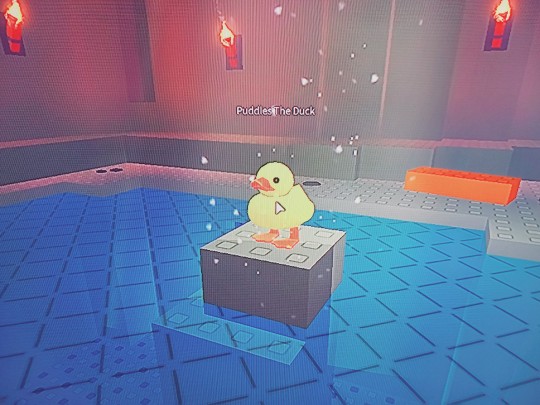
142 notes
·
View notes
Text
I seriously think Emmelyn's role is going to be pivotal in giving Unicorn back their humanity and empathy.
As seen at the end of A Fateful Encounter and the beginning of What Lies Beneath, Emmelyn was more proficient with her powers and more effective when Melinda took control of their body. She immediately gave chase to the Evil, cornered her and was about to vanquish her once more, all by herself...
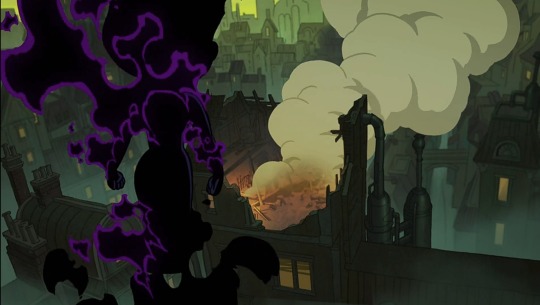
...until she saw the damage her powers caused to that poor family's home and lives.
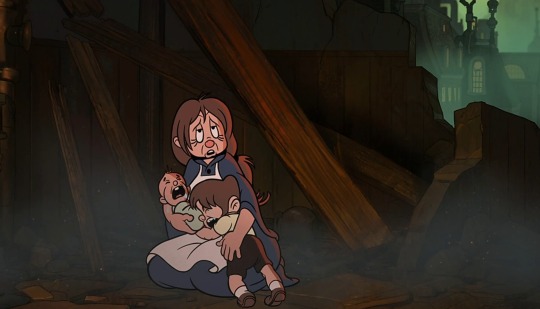
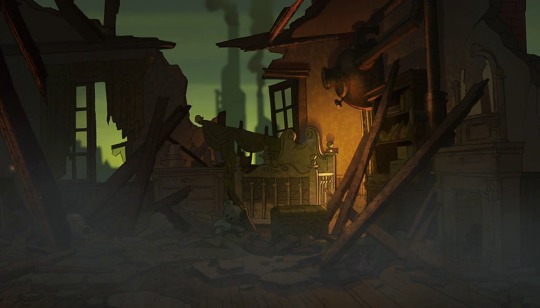
From then on, it's Emma who asserts herself over Melinda's soul again, horrified at the damage she caused.
But here's the thing, she's the only member of Unicorn who pays the poor woman and her kids any mind. Edred, despite witnessing the state the house is in, quickly brushes it off because Melinda let the Evil escape, not once sparing a glance to the innocent people whose lives they just essentially ruined.
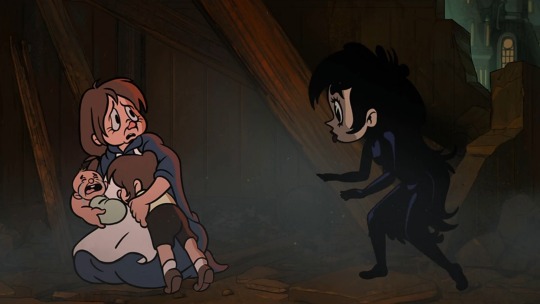
And that seems to be Unicorn's recurring flaw: they are so laser-focused on defeating the Evil in the name of humanity, they tend to overlook the individuals they're supposed to be trying to help.
This episode showcased this brilliantly: when Melinda's fire destroyed the bridge and threatened with harming lots of innocents, Edred and Copernicus were quick to solve the problem. The civilians even cheered for them!
But when it comes to dealing with people's problems individually, they tend to disregard them in the name of the greater good. Unicorn will do what's objectively right or best, which is usually the needs of many over one person's issues or desires, but they won't stop to think about the possible consequences of their actions beyond vanquishing the Evil.
This is especially prevalent during Emma and Melinda's confrontation last episode. Through Melinda's callous treatment of Emma and refusal to see things from her point of view, as she is devoted to their cause and Emma's refusal to merge with her directly threatens their mission, she also fails to understand asserting herself over Emma only serves in alienating her more.
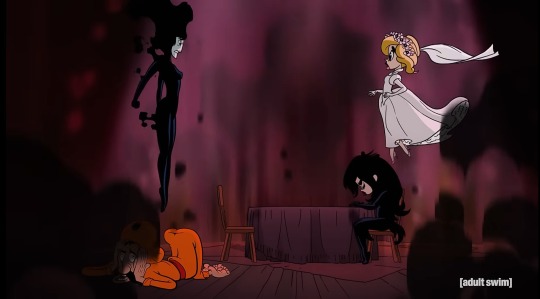
If only Melinda had tried a gentler approach in explaining to Emma she is not responsible for the turn her life took but they really need to work together or hers won't be the only life that prematurely comes to an end, then chances are Emma wouldn't be resisting her and her powers as much as she's doing right now.
Edred has this same problem too, as evidenced through his interactions with Winston. Instead of explaining that the woman he loves isn't exactly there anymore, he coldly tries to push him aside, to get him to leave Emmelyn alone. He doesn't even try to relate to the boy's problem, even when they're essentially one and the same! Both Edred and Winston are terrified of losing their beloved because she's not acting like herself and, no matter what they do, she is constantly pushing them away. But because Edred has grown unaffected by people's struggles outside of saving them from the Evil, not helped by the fact that his actions are also fuelled by jealousy, he makes no effort to sympathise with Winston or even offer an apology or words of comfort. He just wants him out of their way and away from Melinda.
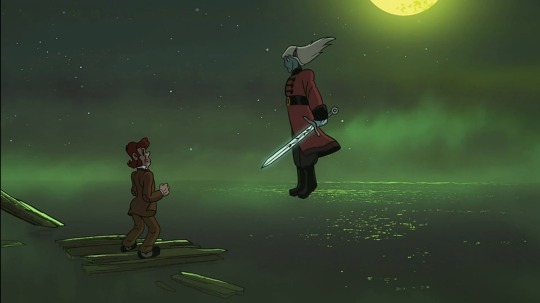
But with Emmelyn, it's precisely the fact that Emma can actually get Melinda to snap out of it and take control over their body that she realised their current actions are doing more harm than good to the people they're supposed to protect. Meaning, once she explains to the others why she's holding back, how fully giving in to Melinda means more people will suffer in the long run unless they start doing things differently, maybe it'll help Edred, Seng, and Copernicus realise they need to understand those they're trying to protect better and that tackling things as a whole won't always be the answer. Otherwise, they're only going to do more harm than good and, as with their reincarnations, the cycle will only begin once more.
#btw Emmelyn is how I call Emma/Melinda unless I'm talking about one of them in specific#since she's in this weird stare where she's simultaneously both women snd neither#unicorn: warriors eternal#unicorn warriors eternal#unicorn warriors eternal spoilers#uwe#uwe spoilers#uwe analysis#emmelyn#emma fairfax#melinda#melinda the sorceress#edred#edred the warrior elf#winston#seng#seng the cosmic monk#copernicus#genndy tartakovsky#toonami#adult swim
609 notes
·
View notes
Text
Why am I obsessed with the rift?
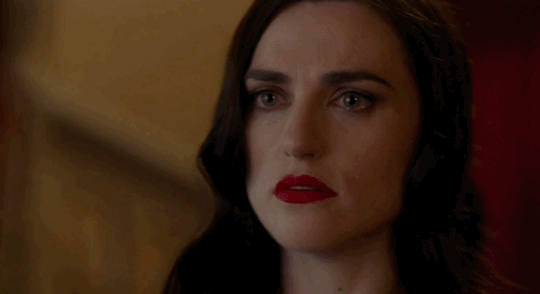
From my first fic to the many many many many season 5 fics I've written, to the fic where the whole thing could've been averted in season 2, to my no-villain-era-for-Lena in season 3 (twice) and season 4 fics......... I seem to have developed a bit of a rift pattern.
A reasonable person might ask: Why?
There's something that itches in my mind: I think either woman would've been fully justified in walking away from their friendship, and yet they ultimately didn't.
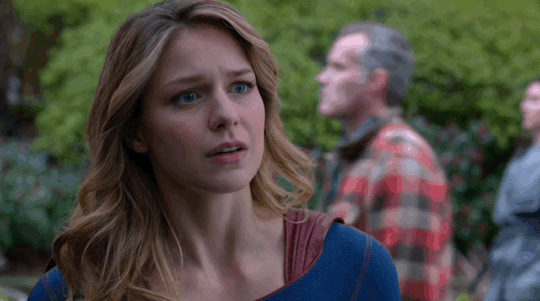
It starts with Kara, who is ultimately a fractured person. She deeply values the truth, and yet she's forced to live with various lies, unable to be her full self.
Her identity is in the in-betweens. She feels adrift between two cultures, she knows her alien state while reaping the privilege of passing, she hides core aspects of herself on a daily basis. I'm sucked into the rift, in part, because of who she is and how she struggles to put it all together. I think her frustration will resonate with anyone who's stuck in the in-betweens.
Kara's struggle for identity plants the seed for the rift. The bigotry of society meant she had to have a secret identity in the first place, and keeping the secret from Lena was certainly reasonable for a time.
We can debate endlessly about when Kara should've told Lena - I think it's really hard to find the line between "too soon" and "too late" - but it ultimately doesn't matter. Because it's Kara's kneejerk reaction to Lena's kryptonite that forms the first sort of betrayal, not the secret itself.
Kara screws up - she says something she regrets, she doubles down when threatened and scared. These are common mistakes... but we have super-level circumstances, so we get super-level consequences. And the engine she has inside her that fears loss (which she's suffered to a level that is unimaginable to anyone on Earth) kicks in. She can't lose another person she loves.
But who is she holding onto?
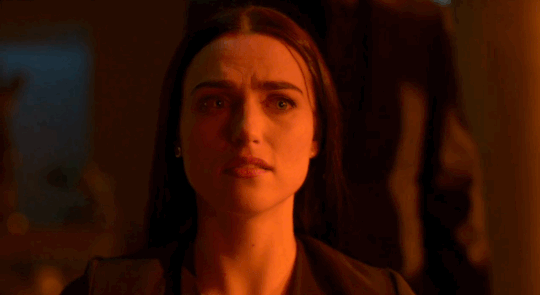
In the series, and in flashbacks, we watch Lena's progression from idealistic techie to cynical recluse. While she's experienced loss and isolation, that's not the cause of her shift.
It's in experiencing her idol and protector become the madman who kidnaps her. It's in realizing her best friend has betrayed her by taking the one thing that could've saved her brother. It's in moving to a new city to start over, and meeting a mentor who uses her to start a global invasion. It's in her partner in scientific discovery being a pawn to her brother, colluding behind her back.
And then there's the final downfall. Her new best friend - her trusted confidant, her hero, the one who made her feel not so alone anymore - is the super who denigrated her, maligned her, spied on her. Lena had two important people in her life at that point, and she sacrificed one for the other... only to find out the other was a lie.
With betrayal after betrayal - Lex and Andrea and Rhea and Eve and Kara - she loses faith that anyone is above their worst impulses.
So she falls to her own.
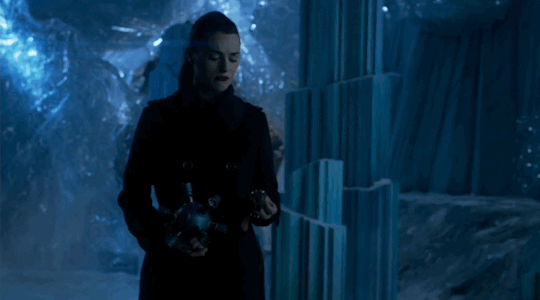
How can good people do bad things?
There's a saying I heard around MIT sometimes: there are no technical solutions to social problems. It's easy to forget - when you're surrounded by people seeking to improve the world via science and engineering - that you can't solve humanity via technology or logic or rules. Lena forgot this.
Myriad marks a shift in the rift. Kara lied to Lena, antagonized her, spied on her - but her wrongs were directed towards Lena. Lena's initial response - the petty manipulation and the plan to out Kara - were directed back at Kara.
But then the rift fundamentally shifts.
At this point, Lena's wrongs are no longer just about Kara - she's trying to brainwash the world. She mindcontrolled Malefic and enslaved Eve. This went beyond the fallout between two friends.
It's clear that her intentions are still good here. She's not a megalomaniac like her brother, she's not forming an us-vs-them mentality like her stepmother. She's an anti-villain at this point in the story - desperate to find what's true, in a world full of lies.
It's a hard line to walk, acknowledging Lena's trauma and well-intentioned motivations while realizing she's still ultimately culpable for her own actions. But it's important to try to balance, because Lena is still redeemable.
But getting back to the relationship itself - Kara played a large role in pushing Lena to the edge of her trauma, which was entirely motivated by Kara's own trauma.
You hide things so you don’t lose people. I run from people who hide things. I guess we were bound to explode.
Lena says this in my first fic mentioned earlier, and it summarizes the rift as succinctly as I can put it. Their traumas were incompatible, and their relationship should've failed.
And yet.
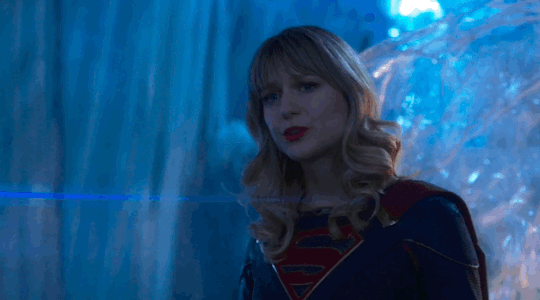
Delving into how the CW screwed up the rift could be its own essay. They gave us a complex and layered situation, only to gut it with It's a Super Life (beloved/beloathed), the narrative retroactively justifying Kara instead of examining her foils, glossing over Lena instead of delving into her ethical blindspots. The rift was cancelled.
What does that leave us with?
Well, I guess it left me seeking the rift, over and over again. I'm certainly not the first author to do a rift fic, and I doubt I'll be the last. There seem to be a few different approaches:
Some authors delve into the nuance, having the two characters hash out what they've been through in a way that feels balanced and real. In particular, I love the @searidings fic with the birds i'll share this lonely view. I don't think I have the skill to pull off that type of story.
Some writers lean heavily on one "side" or the other, often with lots of grovelling. This never resonates with me, because at some point in a relationship there has to be the realization that it's "us vs. the problem", rather than "you vs. me". In my mind, these fics miss the layers of trauma that led to the rift.
Some authors make the rift not matter. If you put the characters through hell and back, the anger will lose its thrust, and they'll be left wanting to heal.
I fall into the last category.
There's a moment from permanence by @itllsetyoufree that I especially love, where - in the aftermath of season 6 - Eliza asks Lena why she forgave Kara. Lena can't answer.
We like to think we're logically driven. But in my experience, forgiveness - and a host of other emotions - never work that way. Sometimes "sorry" cuts it, sometimes it doesn't. A lot of times, forgiveness comes from the realization that someone genuinely wants to connect, and that the fallout was relatively unimportant in the grand scheme of things.
Of course, when your fallout includes extra levels of gaslighting and a bit of global brainwashing, making it relatively unimportant requires something drastic.

That's where I end up landing. Putting my blorbos in Situations helps them see the other in a new light - see the other's genuineness, the other's fears, the other's love. Often times, this comes with the simultaneous threat to someone's life (though that's not necessary, especially if it's earlier in Lena's breaking point cutoff).
I do assume - and sometimes imply - that they're also having those discussions, working things out in the background. Because of what I put them through in my fics, I don't think those end up being explosive discussions. It's about figuring out the practical aftermath of what the heart already knows at that point.
Whether I deliver on that is ultimately up to the reader, but that's my approach. Because at the end of the day, love is about cherishing and understanding the person in front of you - flaws and and traumas in all. These stories are driven by loving both characters, and trying to see them the way they see each other.
The rift is a story about love and connection - how those things can't happen without embracing someone else's trauma and without understanding one's own imperfection. Because that's what's at the root of all of us.
And that's why I write the rift.
#this felt good to finally put into words#(note: this approach made writing the pre-S5 fics particularly rough but that's a tangent that didn't fit in here)#(I don't delve into every ethical question either but I wish the show had)#supercorp#headcanon#mel stuff#sg musings
124 notes
·
View notes